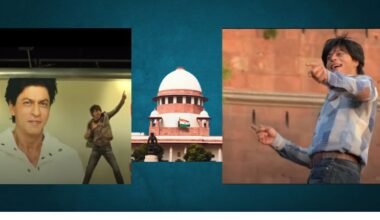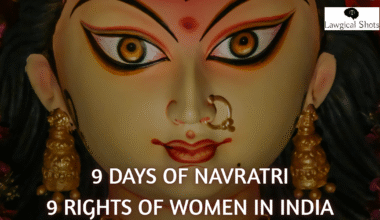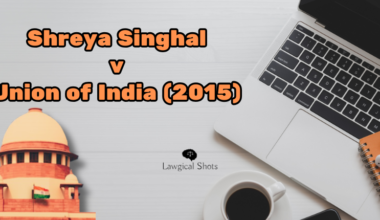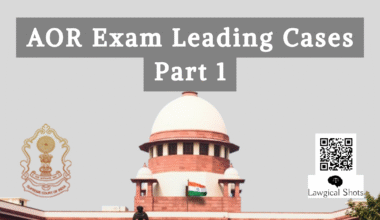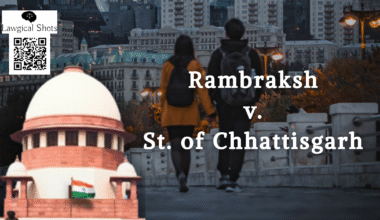Switching off the fan, opening curtains, switching on all the lights, splashing water, switching on the TV with higher volume……just some of the many tricks used by parents of 90s kids to wake up their children. We mentioned it all because here, we are going to discuss the right to sleep as a fundamental right in India. However, it is a disclaimer not to use this as an excuse in front of your parents, or the writer won’t be responsible for any flying chappal so received.
This was the funny side, but there are other sides of the coin. Imagine someone who has to travel 4-5 hours on a daily basis and had a hard day at work. When the person comes back home, the only thing he/she wants is a good night’s sleep. Now, if there is some loud noise which creates disturbance on a regular basis, this person will surely be annoyed. The lack of sleep may even affect this person’s physical and mental health. So why should the right to sleep not be a fundamental right? Even the Courts in India recognized this as a basic right. Let’s catch up with some legal developments in this regard.
Right to sleep a fundamental right as per Indian Courts
Right to sleep v. Microphone for Azan
In a first, The Calcutta High Court in Moulana Mufti Syed Md. Noorur Rehman v. State of West Bengal (decided on March 4, 1999) held that “Right to sleep is not only a fundamental right, it is to be considered as a basic human right….None can claim an absolute right to suspend other rights or it can disturb other basic human rights and fundamental rights to sleep and leisure.” The Writ Petitioners had challenged the applicability of certain provisions of the Environmental (Protection) Rules, 1986 at the time of call of Azan from mosques.
Every citizen has right to sleep peacefully at night: MP High Court
The Madhya Pradesh High Court in Sayeed Maqsood Ali v. State of MP and ors (decided on March 19, 2001) upheld the importance of sleep while dealing with a challenge against noise pollution. The Court remarked that “Every citizen is entitled under Article 21 of the Constitution to live in a decent environment and has the right to sleep peacefully at night. Not for nothing it has been said sleep is the best cure for waking troubles and the sleep of a labouring man is sweet. Sleep brings serenity. Lack of sleep creates lack of concentration, irritability and reduced efficiency.”
Supreme Court’s Ramlila Maidan Case
The matter dates back to 2011 when Baba Ramdev along with his thousands of supporters held an indefinite hunger strike at Delhi’s Ramlila Maidan. The protestors were peacefully sleeping at midnight when several hundreds of CRPF, Delhi Police and RAF reached the Ramlila Maidan leading to a scuffle. The Supreme Court of India took suo motu cognizance in Re: Ramlila Maidan Incident dated 4/5-06-2011 and observed that “right of privacy and the right to sleep have always been treated to be a fundamental right like a right to breathe, to eat, to drink, to blink, etc.” Therefore, the Court recognized the right to sleep as a fundamental right and also discussed its reasonability in detail.
Right to Sleep a basic human right: Bombay HC
In a recent decision in Ram Kotumal Issrani v. Directorate of Enforcement (decided on April 15, 2024), the Bombay High Court rebuked ED for interrogating the 64 year old medically unfit petitioner the whole night, keeping him awake for 20 hours without any reason. The Court held that “Recording of statement, at unearthly hours, definitely results in deprivation of a person’s sleep, a basic human right of an individual.”
Inference
With reference to the aforementioned decisions of the Indian Courts, it can be grasped that the right to sleep is indeed recognized as a basic right. However, it does not become an absolute one, but just like any other right, comes with some restrictions of reasonableness. Thus, it does not warrant unrestricted sleep 24*7. It only means that at reasonable hours when the world is supposed to be asleep, i.e., night hours, there should not be any unwarranted disturbance.
Frequent Queries around Right to Sleep
Q- What is Article 21 in Indian law?
A- Article 21 of the Constitution of India pertains to the Protection of life and personal liberty and lays down that “No person shall be deprived of his life or personal liberty except according to procedure established by law.”
Q- Is Article 21 related to sleep?
A- The Article does not directly relate to sleep but to life and personal liberty of a person. The Courts in India, however, interpreted the same at several instances. Thus, the rights to education, medical aid, legal aid, etc. all emerged from Article 21 of the Indian Constitution.
Q- Is the right to sleep a fundamental right in India?
A- There have been numerous cases wherein the Supreme Court and several High Courts in India recognized the right to sleep as a fundamental right.
Q- Why is sleep fundamental?
A- Sleep is fundamental for the human body to function properly. In fact, the Bombay High Court in a recent case explained the right to sleep as fundamental with the words – “The `right to sleep’ / ‘right to blink’ is a basic human requirement, inasmuch as, non-providing of the same, violates a person’s human rights. It affects a person’s health, may impair his mental faculties, cognitive skills and so on.”


